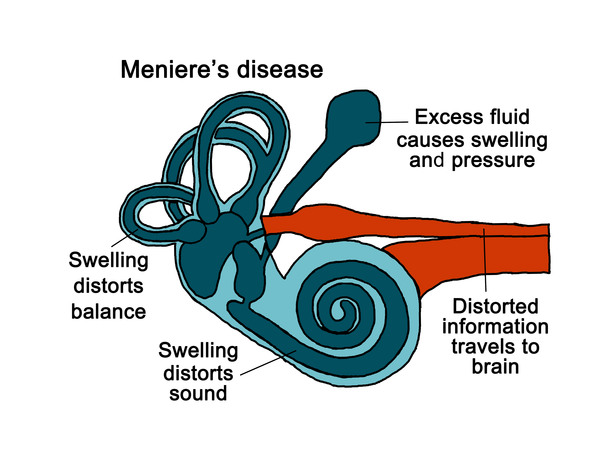Meniere’s disease is a disorder of the inner ear that causes episodes of vertigo (spinning sensation), fluctuating hearing loss, tinnitus (ringing in the ears), and a feeling of fullness or pressure in the ear. It typically affects only one ear and is thought to be caused by an abnormal buildup of fluid in the inner ear, leading to changes in pressure.
Overview:
Meniere’s disease is a chronic condition that can have a significant impact on quality of life due to the unpredictable nature of its symptoms. It often develops in people aged 40-60 years, although it can occur at any age. The exact cause of Meniere’s disease is not fully understood, but it is believed to involve a combination of genetic predisposition, autoimmune response, and environmental factors.
Symptoms:
- Vertigo: Intense episodes of vertigo can last from a few minutes to several hours, often accompanied by nausea and vomiting.
- Hearing loss: Fluctuating hearing loss, which may become permanent over time. Initially, hearing loss tends to affect low frequencies, but it can progress to involve all frequencies.
- Tinnitus: Ringing, roaring, buzzing, or other noises in the affected ear.
- Aural fullness: A feeling of pressure or fullness in the affected ear.
Prevention:
As the exact cause of Meniere’s disease is not known, specific prevention methods are not established. However, managing certain lifestyle factors may help reduce the frequency and severity of symptoms:
- Dietary changes: Reducing salt intake may help decrease fluid retention in the inner ear, potentially reducing the severity of symptoms.
- Stress management: Stress has been reported to trigger or exacerbate symptoms in some individuals, so stress-reduction techniques like meditation or yoga may be beneficial.
- Avoiding triggers: Identifying and avoiding factors that worsen symptoms, such as certain foods, caffeine, alcohol, and tobacco, can help manage the condition.
Treatment:
Treatment for Meniere’s disease aims to alleviate symptoms and prevent further episodes. It may include:
- Medications: Prescription medications such as diuretics (e.g., hydrochlorothiazide) or vestibular suppressants (e.g., meclizine) may help manage symptoms like vertigo and nausea.
- Intratympanic injections: Steroid injections into the middle ear can help reduce vertigo attacks and improve hearing in some cases.
- Physical therapy: Vestibular rehabilitation therapy (VRT) can help improve balance and reduce the impact of vertigo on daily activities.
- Surgery: In severe cases where other treatments have failed, surgical options such as endolymphatic sac decompression, vestibular nerve section, or labyrinthectomy may be considered to alleviate symptoms.
It’s important for individuals with Meniere’s disease to work closely with healthcare professionals to develop a personalized treatment plan tailored to their specific needs and symptoms. Regular monitoring and adjustments to the treatment plan may be necessary to manage the condition effectively.

































